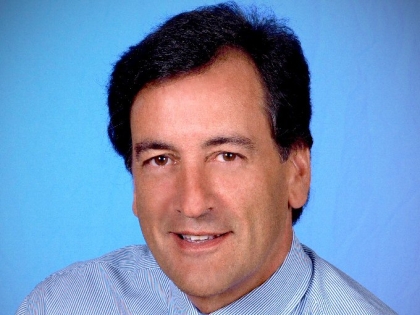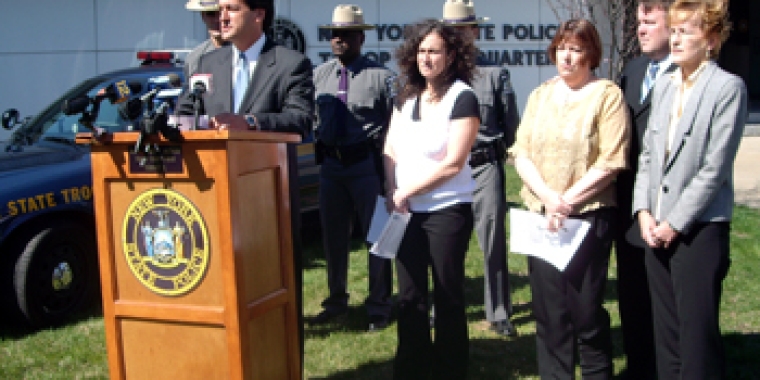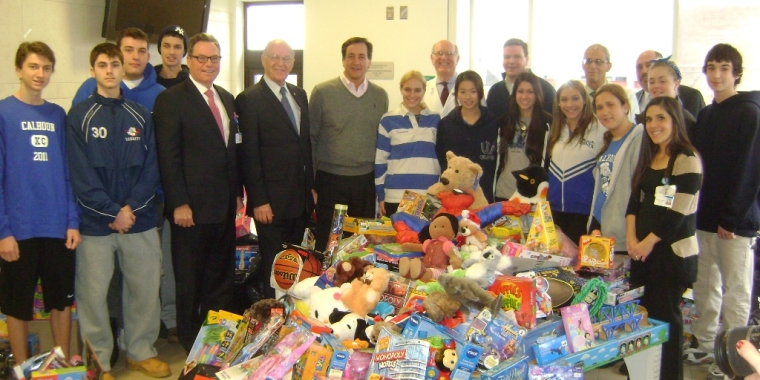
Senator Fuschillo Announces State Funding For Defibrillators In On-duty State Police Vehicles

State Senator Charles J. Fuschillo, Jr. (8th Senate District) announced today that he successfully fought to secure $1.7 million in the 2007-08 state budget to purchase automated external defibrillators (AEDs) for use in on-duty State Police vehicles and train State Troopers in their use. State Troopers from New York State Police Troop L, as well as family members who lost loved ones to cardiac arrest, joined Senator Fuschillo in praising the new measure.
"Cardiac emergencies can strike in the blink of an eye, and the difference between life and death is a matter of minutes. That is why it is vital for first responders to be equipped with life-saving AEDs," said Senator Fuschillo. "The State Police protect the safety of the many drivers who use Long Island’s parkways every day, and are often the first ones to respond to emergencies on these roads. Giving them this safety equipment will greatly enhance their ability to treat someone who has gone into cardiac arrest, which will save lives and prevent tragedies."
"On behalf of the State Police and Troop L, I would like to thank Senator Fuschillo for successfully fighting to secure the funding needed to put defibrillators in State Police patrol cars," said Major Walter Heesch, Commanding Officer of Troop L. "Senator Fuschillo helped provide Troopers with the life saving tools that are vital to serving and protecting the public. Troopers respond to all types of emergencies, many of them medical, that require them to act promptly in order to safe lives."
People often die because a defibrillator arrives too late. On July 6, 2005, Senior Investigator Thomas O’Neill, a State Police Officer from Troop L with 33 years of service, had a heart attack after struggling with a suspect. His fellow troopers performed CPR, but because they did not have an AED, they had to wait until the Suffolk County Police arrived. However, it came too late for Senior Investigator O’Neill, who died on the way to the hospital, just 3 months before he was scheduled to retire.
"When Tom passed away so tragically at 56 years old, our family was devastated. When we learned that there were no AED's in any of the police cars or barracks, my sister, Kathleen Flood and I decided it was an unacceptable situation, for the State troopers who protect us as well as the citizens of New York State who they serve. As healthcare professionals we know the value of these devices and how they can save lives when used in the first minutes of a cardiac event. We want to thank Senator Fuschillo for having the foresight to also know its value. It is a fitting tribute to Tom, whose whole life revolved around helping others." said Senior Investigator O’Neill’s sister, Muriel O’Neill Worst.
"People of all ages can go into cardiac arrest anyplace at anytime. AEDs are critical in helping victims survive sudden heart failure, and making these important safety devices more accessible will help save lives. I thank Senator Fuschillo for continuing to fight to increase the use of AEDs across New York State," said Jill Levine, whose 9 year old son Robbie died suddenly after going into cardiac arrest at baseball practice in 2005. Jill and her husband Craig are the founders of the Robbie Levine Foundation, which strives to help prevent heart disease and increase the use of defibrillators throughout local communities.
Over the past five years, New York has enacted laws to require AEDs in schools, health clubs and fitness centers and all state buildings and institutions.
Time is critical when responding to cardiac arrest. According to the American Heart Association, which supported Senator Fuschillo’s plan to equip State Police vehicles with automated external defibrillators (AEDs), a victim’s chance of survival decreases 7-10 percent with every minute that passes without defibrillation. After as little as 10 minutes, very few resuscitation attempts are successful.
The American Heart Association estimates that sudden cardiac arrests claims the lives of approximately 250,000 people every year, and that with proper access to defibrillators, 50,000 lives could be saved.
TO SEND AN EMAIL TO SENATOR FUSCHILLO, PLEASE CLICK HERE.
IF YOU WOULD LIKE TO RECEIVE REGULAR UPDATES FROM SENATOR FUSCHILLO, PLEASE CLICK HERE.


